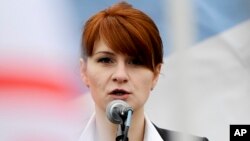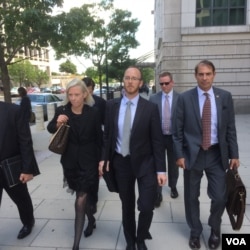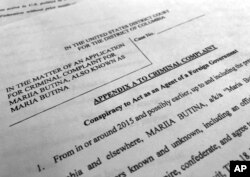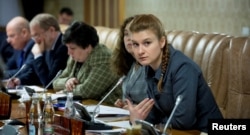A federal magistrate judge Wednesday ordered Maria Butina, who has been accused of being a Russian agent, held in jail after prosecutors presented evidence alleging she had ties to Russian intelligence services.
Butina, a 29-year-old aide to a prominent Russian government official, was arraigned in federal court in Washington on one count of conspiracy and one count of acting as an illegal foreign agent. She pleaded not guilty to the charges.
The charges allege she was part of a secret, yearslong effort to influence American politics by making connections with politically influential Americans and infiltrating prominent religious and political organizations in the United States.
U.S. Magistrate Judge Deborah Robinson said prosecutors had “demonstrated that no conditions will reasonably ensure” that Butina will return to court if she’s released from a federal jail in Washington, where she has been held since her arrest during the weekend.
Diplomatic immunity
Erik Kenerson, an assistant U.S. attorney, said even if Butina were forced to surrender her passport as a condition of her bail, Russia could exfiltrate her from the country under diplomatic immunity.
“It can legally get her a new passport, legally get her out of the country,” Kenerson said in a packed courtroom attended by consular staff from the Russian embassy.
Butina, dressed in an orange jumpsuit, showed no emotional reaction as she was led out of the courtroom by U.S. Marshals.
Kenerson presented new evidence of Butina’s alleged ties to suspected Russian intelligence operatives. The evidence was seized during two searches of Butina’s Washington apartment and electronic devices by the FBI, which had kept her under surveillance for more than a year.
One document contained a contact list of individuals identified as employees of the Russian intelligence agency FSB, Kenerson said. Another document “contained a handwritten note, entitled ‘Maria’s "Russian Patriots In-Waiting" Organization,’ and asking ‘How to respond to FSB offer of employment?’” according to court filings.
Butina was also photographed by FBI surveillance in March dining with a suspected Russian intelligence officer in Washington. The agent was among 60 Russians, believed to be spies, expelled by the United States in March in response to the March 4 poisoning of former spy Sergei Skripal and his daughter Yulia in England.
“Based on this and other evidence, the FBI believes that the defendant was likely in contact with the FSB throughout her stay in the United States,” prosecutors wrote in court documents. “The concern that Butina poses a risk of flight is only heightened due to her connection to suspected Russian intelligence operatives.”
Dismisses allegations
Robert Driscoll, Butina’s personal attorney, dismissed the allegations of ties between Butina and Russian intelligence as speculation.
“Having dinner with a Russian national is nothing special at all,” Driscoll said.
He said that Butina has cooperated with several government inquiries and opted not to leave the country, even as she’s come under growing scrutiny in recent months. The FBI raided her apartment in April and yet she decided to stay in Washington, Driscoll added.
Butina’s arrest came as the FBI feared she was preparing to leave town, according to prosecutors. Her apartment lease was set to expire July 31, and there were boxes packed in her apartment, they added.
But Driscoll said that Butina was leaving for South Dakota to move in with her boyfriend, a 56-year-old American political operative that prosecutors say introduced Butina to prominent Americans and political organizations.
The core charge against Butina alleges that she used her relationship with organizations such as the National Rifle Association to create a “back channel” between Russia and the Republican Party and to change the party’s attitudes toward Moscow.
According to prosecutors, Butina carried out the scheme at the direction of a top Russian government official. The official is not named in court documents, but his descriptions match that of Alexander Torshin, a deputy governor of the Russian central bank and a former senator in Russian President Vladimir Putin’s United Russia party.
Right to Bear Arms
Butina and Torshin founded The Right to Bear Arms, a pro-gun advocacy organization modeled on the NRA, in 2012.
Torshin became a lifetime member of the NRA, and the duo regularly attended the gun lobby’s annual meetings in the U.S. in recent years, according to their social media accounts.
Butina visited the United States several times in 2014 and 2015 before obtaining an F-1 student visa in August 2016 to enroll at American University in Washington. A university official confirmed that she’s been enrolled at the American University School of International Service since fall 2016.
U.S. prosecutors allege that Butina sought to cultivate close ties with the NRA as a conduit to the Republican Party during the 2016 presidential election. The goal was to sway what the Russians saw as the Republican Party’s “negative and aggressive” policy toward Russia, according to an email from Butina that was intercepted by the FBI and cited in the indictment.
Russia’s foreign ministry, calling the allegations against Butina “groundless,” said her detention was carried out to minimize the impact of the recent summit between Putin and U.S. President Donald Trump.







